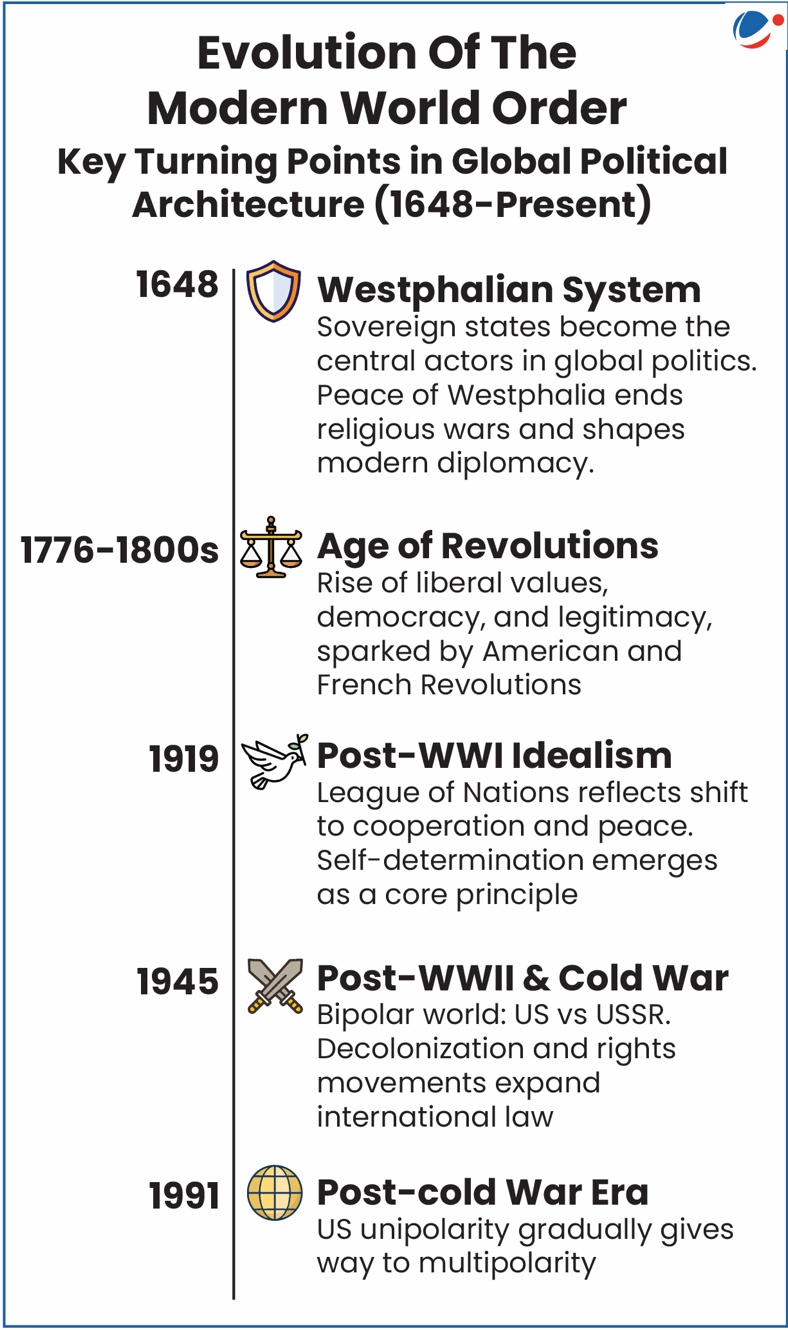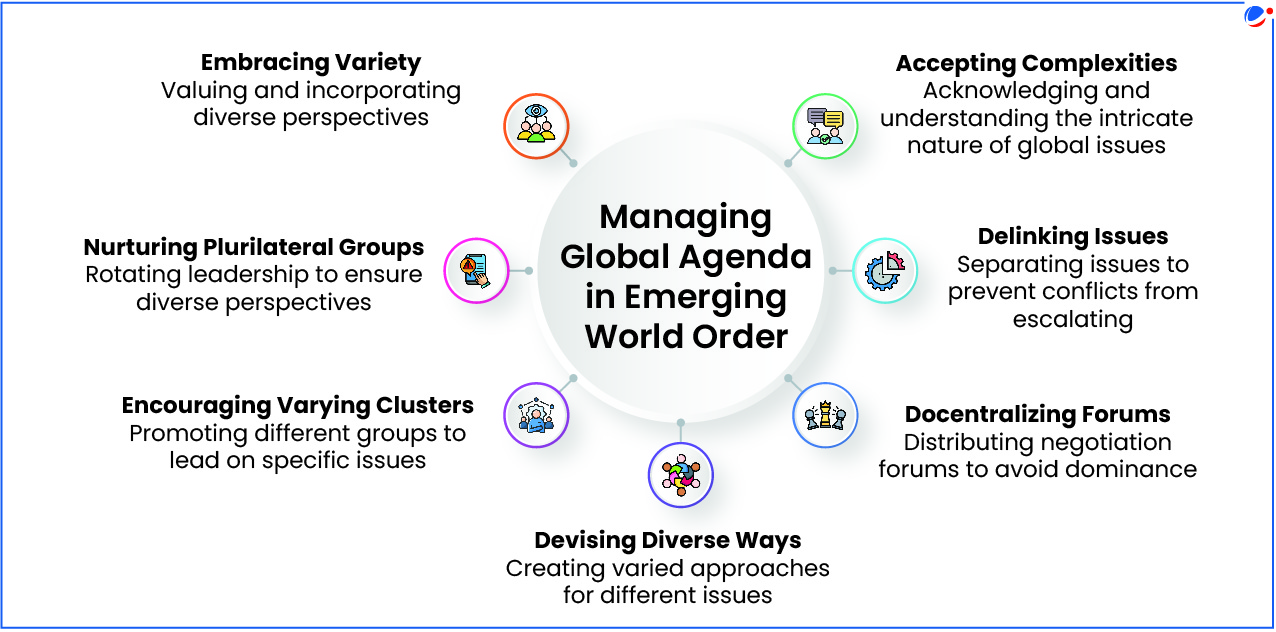Why in the News?
At the BIMSTEC meeting, External Affairs Minister highlighted that the new world order will be regional and agenda-specific.
About World Order
- Definition: World order refers to the arrangement of power and authority that provides the framework for the conduct of diplomacy and world politics on a global scale.
- In the world affairs, 'order' brings a certain method in the way one country conducts its affairs with other countries.

Factors contributing to Emergence of New World Order
- Decline of the Post-War Multilateral Order: For instance, the United Nations, once a pillar of global governance, appears outdated. Multilateralism is no longer effective in managing global threats.
- E.g., UN has struggled to address major conflicts like the Russia-Ukraine war and the Gaza crisis.
- Rise of Polycrisis and Global Instability: The world is facing simultaneous, interconnected crises (wars, climate change, populism).
- E.g., Russia's invasion of Ukraine, trade war, cyber warfare, pandemic, etc.
- Rise of Regional & Agenda-specific geopolitics: For instance, the emerging world order emphasizes empowering the Global South by strengthening independent multilateral platforms.
- E.g., BRICS aims to reduce over-reliance on traditional powers and enhance South-South cooperation.
- There's a shift toward being "non-West" without being "anti-West".
- Rise of Multipolarity: The emerging world order is no longer dominated by one (unipolar) or two (bipolar) superpowers but shaped by several influential nations asserting autonomy.
- For instance, India demonstrated its independent stance by maintaining 'strategic autonomy' and abstaining from UN votes condemning Russia during the Ukraine conflict.
- Rise of Strategic Self-Help: "World is moving to an era of self-help. Every region needs to look out for itself — whether it is in food, fuel and fertilizer, vaccines or speedy disaster response." – EAM S. Jaishankar
- For instance, shorter supply chains (Near Shoring) & immediate neighbours (e.g., BIMSTEC countries) have much more salience now.
Opportunities for India in an Emerging World Order
- India as Voice of the Global South: India's pluralistic, non-Western democratic model offers an alternative to existing world order that neglects the needs of the Global south.
- E.g., India hosting the G20 under "Vasudhaiva Kutumbakam" theme; advocacy for Global South and its aspiration to be a "friend to the world" ('Vishvamitra).
- E.g., Convened "Voice of the Global South Summits" to foster dialogue among developing nations.
- Balanced Multipolarity: Diffusion of power can reduce hegemony and promote democratic internationalism.
- E.g., India's balancing act in BRICS, SCO, QUAD and G20.
- Issue-based cooperation (food, tech, climate): Through compact, efficient platforms.
- E.g., BIMSTEC's focus on connectivity and disaster management; IPEF (Indo-Pacific Economic Framework).
- Digital and Tech Leadership: India leading with platforms like CoWIN, UPI, and Open Network for Digital Commerce (ONDC).
- Climate Diplomacy: Championing green growth and climate finance reform.
- E.g., International Solar Alliance (ISA); Coalition for Disaster Resilient Infrastructure (CDRI).
- Cultural and Civilizational Soft Power: Promotion of India's civilizational ethos as a unifying force in a divided world.
- E.g., International Yoga Day, Indian diaspora diplomacy, Buddhism diplomacy with ASEAN.
Challenges Before India's Role in the Emerging World Order
- Fragmentation of global cooperation due to national interests: E.g., The weakening of the World Trade Organization (WTO) dispute settlement mechanism (U.S. blocking new appointments to the appellate body).
- Hence, dysfunctional global institutions hinder India's trade potential, reflected in its low share of global trade (4.3% in 2023).
- Climate Justice Divide: Developed vs developing countries over climate finance and responsibility.
- E.g., COP27 debate on Loss & Damage Fund.
- Geopolitical Rivalries and Regionalism: Shift from global institutions to regional/informal alignments weakens consensus-building.
- Deglobalization: Nationalism and protectionism reduce economic interdependence.
- E.g., U.S.–China trade war; EU's CBAM (Carbon Border Adjustment Mechanism) will make India's export to EU costly and hence uncompetitive.
- Other challenges: Balancing relationships with competing global powers (US and China); Increasing on-the-ground diplomatic presence; Addressing long-standing border disputes and managing regional tensions, etc.

Conclusion
As the emerging world order gives rise to new definitions of interstate relations, behaviours, and doctrines. India must seize this opportunity to translate its multipolar vision into action by leading the creation of fair, inclusive, and future-ready global rules and institutions.






